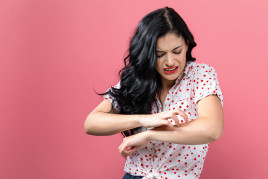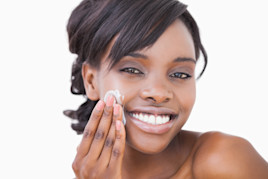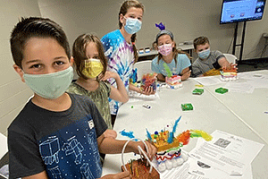Does drinking cause rosacea?

A study published in the Journal of the American Academy of Dermatology concluded that the women who drank alcohol had a higher risk of developing rosacea than the women who didn’t drink. In this study, the researchers found that the:
Risk of developing rosacea increased with the amount of alcohol drank.
Women who drank white wine or hard liquor had a greater risk of developing rosacea than the other women in this study.
Researchers reached these conclusions after analyzing data collected from 82,737 women over a 14-year period.
Two earlier studies also found a connection between drinking alcohol and developing rosacea. In one study, the researchers looked at twins. Studying twins can help scientists figure out if a disease is caused by a person’s genes or behaviors, such as drinking, smoking, or spending time in the sun.
In this study, researchers collected data from 275 pairs of twins. After studying the data, the researchers concluded that drinking slightly increased a person’s risk of getting rosacea.
The second study also found a connection between drinking and rosacea. In this study, researchers compared data from 60,042 patients who had rosacea with 60,042 patients who did not have rosacea. Again, drinking slightly increased the risk of getting rosacea.
More studies required
While these studies found that drinking alcohol may increase a person’s risk of developing rosacea, more studies are needed to know for certain whether drinking can cause rosacea. We don’t know why drinking may increase the risk of getting rosacea. We also want to learn why certain types of alcohol seem to increase the risk of getting rosacea.
People mistakenly believe anyone with a red face drinks heavily
While researchers have found that drinking alcohol may increase the risk of getting rosacea, it’s important to know that:
People who never drink alcohol can get rosacea
Alcoholism doesn’t cause rosacea
Rosacea doesn’t mean the person has a drinking problem
Too often, people mistakenly believe that anyone who has a red face drinks too much, according to the National Rosacea Society (NRS). This misperception may cause people who have rosacea to worry that others will think they have a drinking problem.
After surveying people with rosacea, the NRS reports that nearly two-thirds of them say they “have avoided situations because they felt uncomfortable or embarrassed” when they had a red face.
Too embarrassed to see a dermatologist?
If having a red face leaves you feeling embarrassed, it’s important to keep in mind that people who never drink get rosacea.
Dermatologists encourage anyone who has a permanently red face or long-lasting flushing to see a dermatologist. Rosacea could be causing the redness. Other conditions can also cause a red face. A dermatologist can give you an accurate diagnosis.
If you have rosacea, treatment can help lessen the redness and prevent rosacea from worsening. That can help you feel more comfortable and less embarrassed.
Related AAD resources
Images
Getty Images
References
Aldrich N, Gerstenblith M, et al. “Genetic vs environmental factors that correlate with rosacea: A cohort-based survey of twins.” JAMA Dermatol. 2015;151(11):1213-9.
American Academy of Dermatology, “Study: Alcohol consumption increases rosacea risk in women.” News release issued April 20, 2017.
Li S, Cho E, et al. “Alcohol intake and risk of rosacea in US women.” J Am Acad Dermatol. 2017 Jun;76(6):1061-7.
National Rosacea Society. “Red wine named top alcohol trigger.” Rosacea Review. Fall 2010.
National Rosacea Society. “Red wine found top alcohol trigger for conspicuous facial condition.” News release issued February 11, 2004.
Spoendlin J, Voegel JJ, et al. “A study on the epidemiology of rosacea in the U.K.” Br J Dermatol. 2012;167(3):598-605.
 Atopic dermatitis: More FDA-approved treatments
Atopic dermatitis: More FDA-approved treatments
 Biosimilars: 14 FAQs
Biosimilars: 14 FAQs
 How to trim your nails
How to trim your nails
 Relieve uncontrollably itchy skin
Relieve uncontrollably itchy skin
 Fade dark spots
Fade dark spots
 Untreatable razor bumps or acne?
Untreatable razor bumps or acne?
 Tattoo removal
Tattoo removal
 Scar treatment
Scar treatment
 Free materials to help raise skin cancer awareness
Free materials to help raise skin cancer awareness
 Dermatologist-approved lesson plans, activities you can use
Dermatologist-approved lesson plans, activities you can use
 Find a Dermatologist
Find a Dermatologist
 What is a dermatologist?
What is a dermatologist?